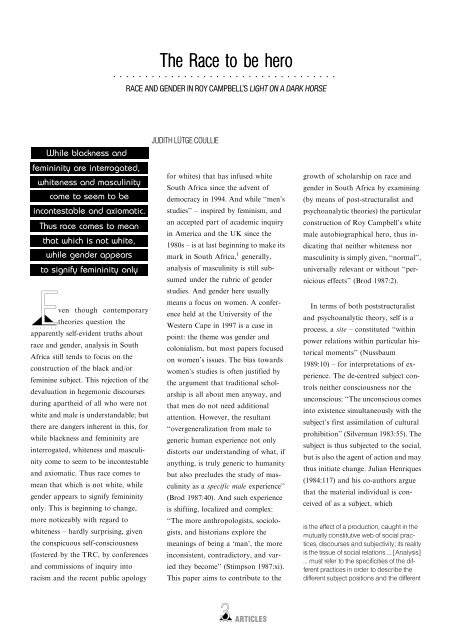Editor Co-editor Associate Editors Editorial Board - University of ...
Editor Co-editor Associate Editors Editorial Board - University of ...
Editor Co-editor Associate Editors Editorial Board - University of ...
You also want an ePaper? Increase the reach of your titles
YUMPU automatically turns print PDFs into web optimized ePapers that Google loves.
The Race to be hero<br />
...................................<br />
RACE AND GENDER IN ROY CAMPBELL'S LIGHT ON A DARK HORSE<br />
JUDITH LÛTGE COULLIE<br />
While blackness and<br />
femininity are interrogated,<br />
whiteness and masculinity<br />
come to seem to be<br />
incontestable and axiomatic.<br />
Thus race comes to mean<br />
that which is not white,<br />
while gender appears<br />
to signify femininity only<br />
~E<br />
.......<br />
ven though contemporary<br />
theories question the<br />
apparently self-evident truths about<br />
race and gender, analysis in South<br />
Africa still tends to focus on the<br />
construction <strong>of</strong> the black and/or<br />
feminine subject. This rejection <strong>of</strong> the<br />
devaluation in hegemonic discourses<br />
during apartheid <strong>of</strong> all who were not<br />
white and male is understandable; but<br />
there are dangers inherent in this, for<br />
while blackness and femininity are<br />
interrogated, whiteness and masculinity<br />
come to seem to be incontestable<br />
and axiomatic. Thus race comes to<br />
mean that which is not white, while<br />
gender appears to signify femininity<br />
only. This is beginning to change,<br />
more noticeably with regard to<br />
whiteness ± hardly surprising, given<br />
the conspicuous self-consciousness<br />
(fostered by the TRC, by conferences<br />
and commissions <strong>of</strong> inquiry into<br />
racism and the recent public apology<br />
for whites) that has infused white<br />
South Africa since the advent <strong>of</strong><br />
democracy in 1994. And while ``men's<br />
studies'' ± inspired by feminism, and<br />
an accepted part <strong>of</strong> academic inquiry<br />
in America and the UK since the<br />
1980s ± is at last beginning to make its<br />
mark in South Africa, 1 generally,<br />
analysis <strong>of</strong> masculinity is still subsumed<br />
under the rubric <strong>of</strong> gender<br />
studies. And gender here usually<br />
means a focus on women. A conference<br />
held at the <strong>University</strong> <strong>of</strong> the<br />
Western Cape in 1997 is a case in<br />
point: the theme was gender and<br />
colonialism, but most papers focused<br />
on women's issues. The bias towards<br />
women's studies is <strong>of</strong>ten justified by<br />
the argument that traditional scholarship<br />
is all about men anyway, and<br />
that men do not need additional<br />
attention. However, the resultant<br />
``overgeneralization from male to<br />
generic human experience not only<br />
distorts our understanding <strong>of</strong> what, if<br />
anything, is truly generic to humanity<br />
but also precludes the study <strong>of</strong> masculinity<br />
as a specific male experience''<br />
(Brod 1987:40). And such experience<br />
is shifting, localized and complex:<br />
``The more anthropologists, sociologists,<br />
and historians explore the<br />
meanings <strong>of</strong> being a `man', the more<br />
inconsistent, contradictory, and varied<br />
they become'' (Stimpson 1987:xi).<br />
This paper aims to contribute to the<br />
growth <strong>of</strong> scholarship on race and<br />
gender in South Africa by examining<br />
(by means <strong>of</strong> post-structuralist and<br />
psychoanalytic theories) the particular<br />
construction <strong>of</strong> Roy Campbell's white<br />
male autobiographical hero, thus indicating<br />
that neither whiteness nor<br />
masculinity is simply given, ``normal'',<br />
universally relevant or without ``pernicious<br />
effects'' (Brod 1987:2).<br />
In terms <strong>of</strong> both poststructuralist<br />
and psychoanalytic theory, self is a<br />
process, a site ± constituted ``within<br />
power relations within particular historical<br />
moments'' (Nussbaum<br />
1989:10) ± for interpretations <strong>of</strong> experience.<br />
The de-centred subject controls<br />
neither consciousness nor the<br />
unconscious: ``The unconscious comes<br />
into existence simultaneously with the<br />
subject's first assimilation <strong>of</strong> cultural<br />
prohibition'' (Silverman 1983:55). The<br />
subject is thus subjected to the social,<br />
but is also the agent <strong>of</strong> action and may<br />
thus initiate change. Julian Henriques<br />
(1984:117) and his co-authors argue<br />
that the material individual is conceived<br />
<strong>of</strong> as a subject, which<br />
is the effect <strong>of</strong> a production, caught in the<br />
mutually constitutive web <strong>of</strong> social practices,<br />
discourses and subjectivity; its reality<br />
is the tissue <strong>of</strong> social relations ... [Analysis]<br />
... must refer to the specificities <strong>of</strong> the different<br />
practices in order to describe the<br />
different subject positions and the different<br />
~3 ....ARTICLES
















